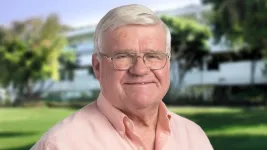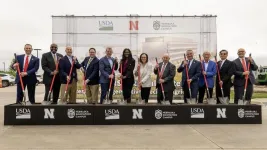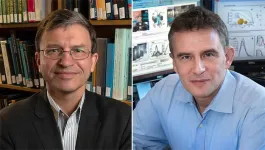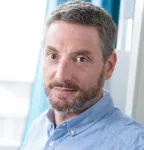(Press-News.org) UCLA Health is set to host a unique symposium this week to explore the evolving research in psychedelic therapies and how combining it with reconnection to natural world could help to amplify their mental health benefits.
The all-day symposium on May 10 at the UCLA campus will bring together the expertise and insights of researchers from UCLA Health’s Psychedelic Studies Initiative and the Jane and Terry Semel Institute for Neuroscience and Human Behaviors as well as filmmakers, psychiatrists, urban planners, indigenous health experts, writers and environmental leaders from throughout the world.
“Promising clinical trials of psychedelics such as psilocybin, ayahuasca and others for depression, substance use disorder and end of life anxiety have led to a surge of interest in, and research support for their clinical use,” said Dr. Helena Hansen, Jane and Terry Semel Institute interim director. “We are committed to equitable dissemination, bringing these therapies to those who are most in need. To do this, we need to rethink the way medicine is practiced, and to relocate where it is practiced.”
“Cultivating Connections: Ecological Medicine Meets Psychedelic Therapies” will include seminars, breakout sessions and film screenings on a variety of topics including the integration of psychedelic therapy with ecological medicine; nature prescriptions, designing ecological medicine laboratories; and social and health justice in human-environment interactions.
A full agenda can be found online at https://reconnect.ucla.edu/activities/
Clinical research of psychedelic therapies has found promise for treating mental health disorders such as depression, substance use disorder, post-traumatic stress disorder and anxiety as well as pain disorders. The results have led to increased interest and support for clinical use in medicine. The California Legislature is currently considering a bill that would allow for psychedelic-assisted therapy for persons 21 and over under the supervision of a licensed, trained facilitator.
Ecological medicine is a relatively new field of research into the interconnections of the health of the environment, ecosystem and living organisms.
UCLA Health is proposing to integrate these two fields of study through the construction of a “Living Ecological Medicine Laboratory” on the enclosed rooftop deck of the Semel Institute at the UCLA Health campus. Envisioned as a green space with native plant gardens and a refuge for pollinators, the proposed outdoor lab would allow researchers to test the efficacy and safety of psychedelic-assisted therapies in greenspace exposures. Additionally, researchers and clinicians would have access to neuroimaging and research facilities within the same building.
How to Attend and Press Contacts
The May 10 symposium will run from 8 a.m. to 6 p.m. PDT on May 10 and will be livestreamed via Zoom. Attendees and members of the press may register to attend at https://zoom.us/meeting/register/tJ0ld-morT0rHdzxlji2jv1zGIUJ1JsyFEu0#/registration
In-person attendance is currently full, but a waiting list is available for those who wish to attend in person.
Dr. Helena Hansen and Dr. Charles Grob, founder and clinical director of the UCLA Psychedelic Studies Initiative, are available for interviews before and following the symposium to discuss the Living Ecological Medicine Laboratory and current research.
For more information or to schedule an interview, please contact UCLA Health media relations officer Will Houston at whouston@mednet.ucla.edu or 310-948-2966.
UCLA Health is set to host a unique symposium this week to explore the evolving research in psychedelic therapies and how combining it with reconnection to natural world could help to amplify their mental health benefits.
The all-day symposium on May 10 at the UCLA campus will bring together the expertise and insights of researchers from UCLA Health’s Psychedelic Studies Initiative and the Jane and Terry Semel Institute for Neuroscience and Human Behaviors as well as filmmakers, psychiatrists, urban planners, indigenous health experts, writers and environmental leaders from throughout the world.
“Promising clinical trials of psychedelics such as psilocybin, ayahuasca and others for depression, substance use disorder and end of life anxiety have led to a surge of interest in, and research support for their clinical use,” said Dr. Helena Hansen, Jane and Terry Semel Institute interim director. “We are committed to equitable dissemination, bringing these therapies to those who are most in need. To do this, we need to rethink the way medicine is practiced, and to relocate where it is practiced.”
“Cultivating Connections: Ecological Medicine Meets Psychedelic Therapies” will include seminars, breakout sessions and film screenings on a variety of topics including the integration of psychedelic therapy with ecological medicine; nature prescriptions, designing ecological medicine laboratories; and social and health justice in human-environment interactions.
A full agenda can be found online at https://reconnect.ucla.edu/activities/
Clinical research of psychedelic therapies has found promise for treating mental health disorders such as depression, substance use disorder, post-traumatic stress disorder and anxiety as well as pain disorders. The results have led to increased interest and support for clinical use in medicine. The California Legislature is currently considering a bill that would allow for psychedelic-assisted therapy for persons 21 and over under the supervision of a licensed, trained facilitator.
Ecological medicine is a relatively new field of research into the interconnections of the health of the environment, ecosystem and living organisms.
UCLA Health is proposing to integrate these two fields of study through the construction of a “Living Ecological Medicine Laboratory” on the enclosed rooftop deck of the Semel Institute at the UCLA Health campus. Envisioned as a green space with native plant gardens and a refuge for pollinators, the proposed outdoor lab would allow researchers to test the efficacy and safety of psychedelic-assisted therapies in greenspace exposures. Additionally, researchers and clinicians would have access to neuroimaging and research facilities within the same building.
How to Attend and Press Contacts
The May 10 symposium will run from 8 a.m. to 6 p.m. PDT on May 10 and will be livestreamed via Zoom. Attendees and members of the press may register to attend at https://zoom.us/meeting/register/tJ0ld-morT0rHdzxlji2jv1zGIUJ1JsyFEu0#/registration
In-person attendance is currently full, but a waiting list is available for those who wish to attend in person.
Dr. Helena Hansen and Dr. Charles Grob, founder and clinical director of the UCLA Psychedelic Studies Initiative, are available for interviews before and following the symposium to discuss the Living Ecological Medicine Laboratory and current research.
For more information or to schedule an interview, please contact UCLA Health media relations officer Will Houston at whouston@mednet.ucla.edu or 310-948-2966.
END
Psychedelic therapy and ecological medicine symposium to be held at UCLA
2024-05-07
ELSE PRESS RELEASES FROM THIS DATE:
CU Department of Medicine doctor discusses unintended consequences of patients having immediate access to test results
2024-05-07
In a fast-paced digital age where patients can open their test results as soon as they are available, what happens when a patient reads through complicated results without a physician there to help them understand what it all means? And what happens when a patient misinterprets bad news as good news, or vice versa?
It’s a scenario Benjamin Vipler, MD, confronted after his mom received her colonoscopy results on her health system’s patient portal. Like many patients, she opened up her results before meeting with her clinician and tried to decipher the medical jargon. Thinking the results showed she ...
More feelings of misinformation, more news avoidance, U-M study shows
2024-05-07
As people have more difficulty distinguishing fact from fiction in the United States, they are more likely to feel news fatigue and avoid news altogether, according to a University of Michigan study.
More than an unintentional avoidance because of lack of media exposure, the researchers say people actively avoid news.
The researchers also find that people who identify as strong Democrats begin relying more on nonpartisan news media when feeling misinformed, while people who identify as strong Republicans report using less news media overall, including less conservative news media. Their results are published in Journalism Studies.
"The more confusing ...
Ochsner Health named to Newsweek’s America’s Greatest Workplaces 2024 for Mental Wellbeing
2024-05-07
NEW ORLEANS, La. – Ochsner Health, a leader in patient care, research and education, has been named one of America’s Greatest Workplaces for Mental Wellbeing 2024 by Newsweek and Plant-A Insights Group. The ranking survey conducted included responses from more than 250,000 young professionals and more than 1.5 million company reviews.
Ochsner Health is committed to fostering an environment that prioritizes the mental well-being of each employee through innovative health initiatives, comprehensive support services and a culture ...
Professor emeritus John (Jack) Johnson elected to the National Academy of Sciences
2024-05-07
LA JOLLA, CA—Scripps Research professor emeritus John Johnson, PhD, has been elected to the National Academy of Sciences—one of the highest honors given to scientists. According to the Academy, members are selected “in recognition of their distinguished and continuing achievements in original research.”
“Becoming a member of the Academy is a great honor for me and the 70 graduate students and post docs that have worked in my lab since 1978, as well as numerous collaborators at Scripps and around the world,” says Johnson, who is also the Eldon R. Strahm Professor of Structural Virology in the Department of Integrative Structural ...
University of Nebraska-Lincoln, USDA partner on ground-breaking precision ag research center
2024-05-07
Construction of the National Center for Resilient and Regenerative Precision Agriculture at Nebraska Innovation Campus launched with a ceremonial turning of dirt on May 6.
The state-of-the-art research center is a partnership between the U.S. Department of Agriculture’s Agricultural Research Service, University of Nebraska–Lincoln and Nebraska Innovation Campus. The center will focus on the challenges and opportunities in agricultural innovation for the 21st century.
“There is a long history of scientific innovation and collaboration between ARS and UNL, typical of the USDA-land-grant ...
Two Brookhaven lab scientists named AAAS Fellows
2024-05-07
UPTON, N.Y. — The American Association for the Advancement of Science (AAAS) has recognized two staff scientists from the U.S. Department of Energy’s (DOE) Brookhaven National Laboratory with the distinction of Fellow: Deputy Associate Laboratory Director for High Energy Physics Dmitri Denisov and Senior Chemist Anatoly Frenkel. Each year, AAAS bestows this honor on select members whose “efforts on behalf of the advancement of science, or its applications, are scientifically or socially distinguished.” Marking the 150th anniversary of the program, new fellows ...
Chimps learn and improve tool-using skills even as adults
2024-05-07
Chimpanzees continue to learn and hone their skills well into adulthood, a capacity that might be essential for the evolution of complex and varied tool use, according to a study publishing May 7th in the open-access journal PLOS Biology by Mathieu Malherbe of the Institute of Cognitive Sciences, France and colleagues.
Humans have the capacity to continue learning throughout our entire lifespan. It has been hypothesized that this ability is responsible for the extraordinary flexibility with which humans use tools, a key factor in the evolution of human cognition and culture. ...
AI predicts tumor-killing cells with high accuracy
2024-05-07
MAY 7, 2024, NEW YORK – Using artificial intelligence, Ludwig Cancer Research scientists have developed a powerful predictive model for identifying the most potent cancer killing immune cells for use in cancer immunotherapies.
Combined with additional algorithms, the predictive model, described in the current issue of the journal Nature Biotechnology, can be applied to personalized cancer treatments that tailor therapy to the unique cellular makeup of each patient's tumors.
“The implementation of artificial intelligence in cellular therapy is new and may be a game-changer, offering new clinical options to patients,” said Ludwig Lausanne’s Alexandre ...
Study provides comprehensive analysis of Rhode Island’s unregulated drug supply
2024-05-07
PROVIDENCE, R.I. [Brown University] — A new analysis revealed the frequency of potentially lethal substances, such as fentanyl and xylazine, in counterfeit pills that had been circulating in Rhode Island’s illicit drug supply.
Study author Dr. Rachel Wightman, an associate professor of epidemiology and emergency medicine at Brown University, said the analysis provides important information about the composition of counterfeit pills, which are designed to replicate legitimate pharmaceutical pills but often lead to adverse health effects.
“The level of detail found in our analysis can help inform treatment conversations and improve patient care,” ...
Biomarker found to help identify cells that can repair damaged blood vessels
2024-05-07
INDIANAPOLIS – Researchers have discovered a protein marker to help identify cells able to repopulate in patients with damaged blood vessels. Their findings, recently published in Circulation, could lead to new therapies for people with endothelial dysfunction, a type of disorder that contributes to coronary artery disease that may occlude with plaque and lack ability to carry sufficient blood into the heart tissue causing a heart attack.
“This study is the first to establish that a single, prospective marker identifies vascular clonal repopulating endothelial cells ...




